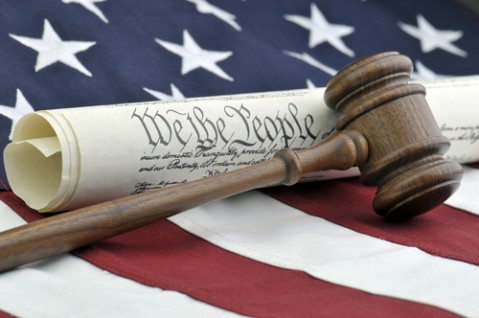A Crash Course in Civic Engagement for Class V
For several weeks each spring, Class V students convene—led by Mr. Thomsen and Mr. Heaton of the history department, and Headmaster Brennan—for a series of lessons in what it means to be responsible, engaged, informed citizens of the United States. This Civics mini-course, conceived of by Mr. Brennan, has been a hallmark of the Class V program since 2011. It provides students early in their RL tenure with a lesson on the inner workings of the United States government, their own civil rights and responsibilities, and the many forms service to country and commonwealth can take.
Though this spring forced all coursework to be done remotely, the students didn’t miss a beat as they delved into topics such as the American election process, our branches of government, and immigration and naturalization. After introductions into what the course would entail, students had a taste of the experience that individuals seeking United States citizenship face, as they attempted to answer questions posed in the American citizenship test. In the following class meeting, boys heard from three members of the RL community who were born outside of the United States and became U.S. citizens by way of three very different paths. Ousmane Diop, chair of the modern language department, has been a member of the RL faculty since 1994. Born in Senegal, West Africa, Mr. Diop came to the U.S. originally as a student at Phillips Andover. Emose Piou—mother of RL alumni Hansenard ‘14 and Noah ‘16—grew up in Haiti with 12 brothers and sisters, and came to America as a young adult to pursue higher education, enrolling at New York Technical College to study engineering. Finally, José Flores of Class III was born in Guatemala City, where he was adopted at age three by his mother and father, who were born in the U.S. Virgin Islands and in El Salvador, respectively. José gained full U.S. citizenship in 2011 but only received his official documents and citizenship ceremony last year. These three individuals shared not only their personal stories, but also similar challenges, such as overcoming language barriers, facing discrimination, and maintaining their own cultures while also trying to acclimate to America.
During a class on the judicial system, and the critical role of jurors, Mrs. Berg, Mr. Lieb, and Mr. Heaton spoke about their experiences serving as jurors on both civil and criminal trials. In a class session dedicated to military service, Captain Colin Murphy, Class of 2005, spoke to students about his active duty service in the U.S. Marine Corps from 2011 to 2015. Colin gave an overview of the structure of the U.S. Military; the extensive training that is required to join; the reality of active duty; and the many paths that veterans take after service. Finally, since a central element of democracy is being informed, the boys learned about the important role of the media and how they can be discerning news consumers.
It is fitting that the Class V Civics course relies on so many teachers. To rely on the collective efforts of many individuals is in itself a lesson on the American government and civic responsibility.

